ESS is proud to house several state-of-the-art research facilities.
UW Fiber Lab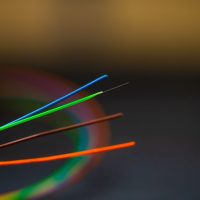
The UW Photonic Sensing Facility, with funding from the M.J. Murdock Charitable Trust, is led by two of our newest faculty, Brad Lipovsky and Marine Denolle, along with Will Wilcock in Oceanography. The facility uses distributed acoustic sensing with optical fibers to monitor and explore surface motion, temperature, and other properties in diverse systems, with applications not only in the study of crustal deformation, but also hydrology, land surface processes, and glaciology. See the Fiber Lab website for more information.
Planetary High Pressure Mineralogy Lab
The mineral physics laboratory, led by Baptiste Journaux and Mike Brown, studies the physical chemistry and thermodynamics of planetary materials at high pressures such as water-rich minerals (ice/hydrates), aqueous liquids, silicates and metals relevant for planetary interiors, with a focus on icy ocean worlds of our solar system and beyond. The lab is equipped with diamond anvil cells and a ultrasonic hydraulic large volume tank high pressure apparatuses, coupled with resistive heating and cryo-cooling and Raman spectroscopy allowing to characterize thermodynamic stability, speciation, sound speed, equations of states, etc. This research led to the discovery of a new forms of NaCl hydrates (see the paper in the Proceedings of the National Academy of Sciences) and the development of the SeaFreeze framework for the thermodynamic representation of water up to extreme conditions.
Δ*IsoLab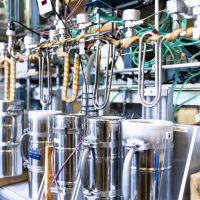
Δ*IsoLab is the isotope geochemistry laboratory of Eric Steig, Roger Buick, Becky Alexander (Atmospheric and Climate Science) and Kate Huntington. Δ*IsoLab researchers use the analysis of light stable isotopes to study the geosphere, atmosphere, hydrosphere, biosphere, and cryosphere. With the help of superlative lab manager, Andrew Schauer, these faculty have developed several widely-used novel methods and instruments, and Δ*IsoLab is recognized as one of the leading light-stable-isotope geochemistry laboratories in the world. Numerous other faculty within the department and across UW and beyond have worked collaboratively with Δ*IsoLab faculty for their research. Like other labs in ESS, Δ*IsoLab is a research lab, not a contract lab. Faculty or students interested in collaborative projects should read the lab’s Sample Analysis policy.
Non-Traditional Isotope Laboratory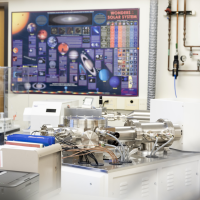
The Isotope Geochemistry Laboratory led by Fang-Zhen Teng comprises two multi-collector ICP mass spectrometers (a Nu Plasma I and a Nu Plasma II) along with four clean labs and 9 laminar flow fume hoods for sample processing. This lab is focused on the development and application of non-traditional isotopes in studies of geological, planetary and biological processes. Our techniques involve both purification of targeted elements through column chromatography in a clean sample preparation laboratory and high-precision isotopic analyses using Multi-Collector Inductively Coupled Plasma Mass Spectrometry (MC-ICPMS). For more information, please contact Dr. Fangzhen Teng.
Geomicrobiology Laboratory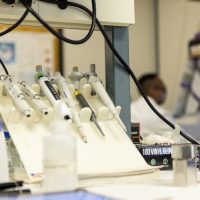
The Geomicrobiology Lab led by Drew Gorman-Lewis houses the facilities necessary for growing microbes and performing low temperature aqueous geochemical and geomicrobiological experiments. The lab contains an autoclave, laminar flow hood, incubator/shaker, and an anaerobic chamber for growing microorganisms. There are two high speed refrigerated centrifuges and a freeze dryer for preparation of biomass and mineral powders. The analytical equipment in the lab consists of an auto-titrator, a spectrophotometer, an inverted light microscope, and an isothermal calorimeter. Research foci in the lab are surface reactivity of minerals and microorganisms and thermodynamics of natural systems. For more information, contact Drew Gorman-Lewis.
Pacific Northwest Seismic Network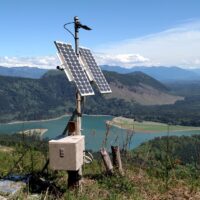
The Pacific Northwest Seismic Network (PNSN), directed by Professor Harold Tobin, is a unit within ESS that also includes colleagues from the United States Geological Survey, several of whom have offices in the department. PNSN is the authoritative seismological facility for the region and has been a leader in developing and implementing earthquake early warning systems for the entire west coast, working in close collaboration with industry and government.
Cosmogenic Nuclide Laboratory
The Cosmogenic Nuclide Lab led by John Stone provides facilities for preparation of samples for analysis of Be-10, Al-26 and Cl-36 in a range of geological materials. The lab contains dedicated areas for mineral separation, low-blank chemical separations and target preparation for accelerator mass spectrometry. Samples produced in the lab are analyzed at accelerator facilities in the United States and Australia. We work on a variety of cosmogenic nuclide applications in geomorphology, paleoclimatology and geologic hazard assessment, as well as basic cosmogenic nuclide methodology. See the CosmoLab website for more information.
TraceLab
The Tracelab is a mass spectrometry facility for the analysis of trace elements in natural and man-made materials run jointly by PIs from Earth and Space Sciences (Marjorie Cantine) and the School of Oceanography. We help users from within UW as well as federal partners, external research groups, and industry through methods development, measurements, and data analysis. Designed to uncover the geological and biological processes that shape our planet, reconstruct past climate, track animal migration, and quantify trace metal contamination. We work with water, minerals, biological samples, and synthetic materials. We conduct small scale mapping as well as bulk analysis.